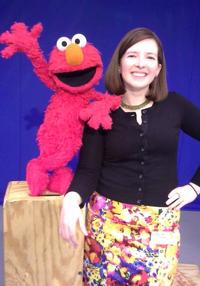Each month the Regional Foundation Center's Inforum newsletter features a local funder, nonprofit, or service provider who highlights their organization's services and how they support the social sector.
This month we are changing things up a bit! In honor of our upcoming career-related programs, we asked Marta Rusek to talk about her experience working for nonprofits. Among many other things, Marta is the leader of the RFC-hosted Nonprofit Nerds Meetup.
Tell us about your experience working in the nonprofit world
I've always felt called to empower individuals and communities through initiatives that educate and facilitate lasting change. That calling has enabled me to work for some very well-respected nonprofits in the United States, both as an employee and as a consultant, including ActionAIDS, The Corzo Center for the Creative Economy (at University of the Arts), Friends General Conference, Women Against Abuse, and Sesame Workshop. My calling also brought me to The Gambia in West Africa as a Peace Corps Volunteer in 2011, where I produced a full-length documentary about Peace Corps' relationship with The Gambia and facilitated one-on-one conversations and trainings about disease prevention and sexual health. I can do culturally-appropriate condom demonstrations in my sleep thanks to my Peace Corps days!
What is the most common myth about working for a nonprofit?
The idea that your well-being and earning power have to be sacrificed when you work at a nonprofit is a very unhealthy myth I've encountered a lot as a nonprofit employee and consultant. I've seen too many good people leave the nonprofit world because they were physically and emotionally burned out and frustrated by not being compensated based on what they were worth. It's true that you have to wear many hats, work with limited resources, and be prepared to earn less than you would in a for-profit company when you work for a nonprofit, but your physical and mental health are important, as is your ability to pay your bills and enjoy your spare time.
In these instances, it's important to be your own best advocate. Set boundaries and communicate them with your coworkers around when you are checking email and doing work (hint - you should be working only when you are physically at the office, on-site at an event, or during the hours you and your supervisor agreed upon if you work remotely). Know how much you are worth by looking at your education and experience, and research the salary for the role you have or want to have by checking websites like Glassdoor. Also factor in your monthly bills and debts. If you're not making the salary you need to sustain yourself and be happy, meet with your supervisor and lay out a compelling case for why you deserve to be paid more. If your supervisor (or the hiring manager) cannot meet or beat your desired salary range, consider other factors, like health benefits, paid time off, and professional development opportunities.
Know what you want out of your experiences and where you want to be professionally in five years, and let that guide your decision to take a job with a nonprofit... or leave it for a better opportunity.
You've worked for both nonprofits and for-profits. Where are their similarities and differences?
Both nonprofits and for-profits have the same goal—to deliver a product or service that adds value to people's lives. It's the workplace cultures that are very different. The best nonprofits are committed to attracting employees from all walks of life and providing a work experience that caters to their strengths and offers flexibility in scheduling and project management. A culture that promotes diversity and flexibility is a big deal for someone like me, because I have a disability. It takes longer for me to learn complex processes and complete my work, and I may need to take a day off if I'm experiencing severe symptoms stemming from social anxiety. I've worked in retail and for the federal government previously, and while I learned a lot about customer service as a result, the rigidity and competitive approach of those environments were not a good fit for me. We all deserve a workplace that embraces us for who we are and is invested in our success, and I've found those qualities more often than not in the nonprofit companies I've worked for over the years.
Any tips for getting a job or working in the nonprofit sector?
Focus on building relationships, not on getting a job. Informational interviews are a great network-building tool that can pave the way to future job opportunities. Go to networking events and ask people about their experiences at the nonprofits they work for, or reach out to someone on LinkedIn who is doing work you would like to be doing and ask them if you can schedule a quick 5 to 10 minute conversation on the phone. Let them lead the conversation, and bring thoughtful questions you would like to be asked if you were on the other side of the phone. I've landed many job interviews because my informational interviewees referred me to the hiring managers of open opportunities, and some of those interviews did lead to job offers in the nonprofit sector. Companies want to hire people they know, and a glowing reference from someone who enjoyed speaking with you on the phone or at a networking event definitely helps your chances.
Thanks for sharing your insights and experiences Marta!
Find your next career working at a nonprofit by check out our upcoming Nonprofit Job Fair or check out one of our upcoming career-focused programs.
Have a question for Free Library staff? Please submit it to our Ask a Librarian page and receive a response within two business days.

